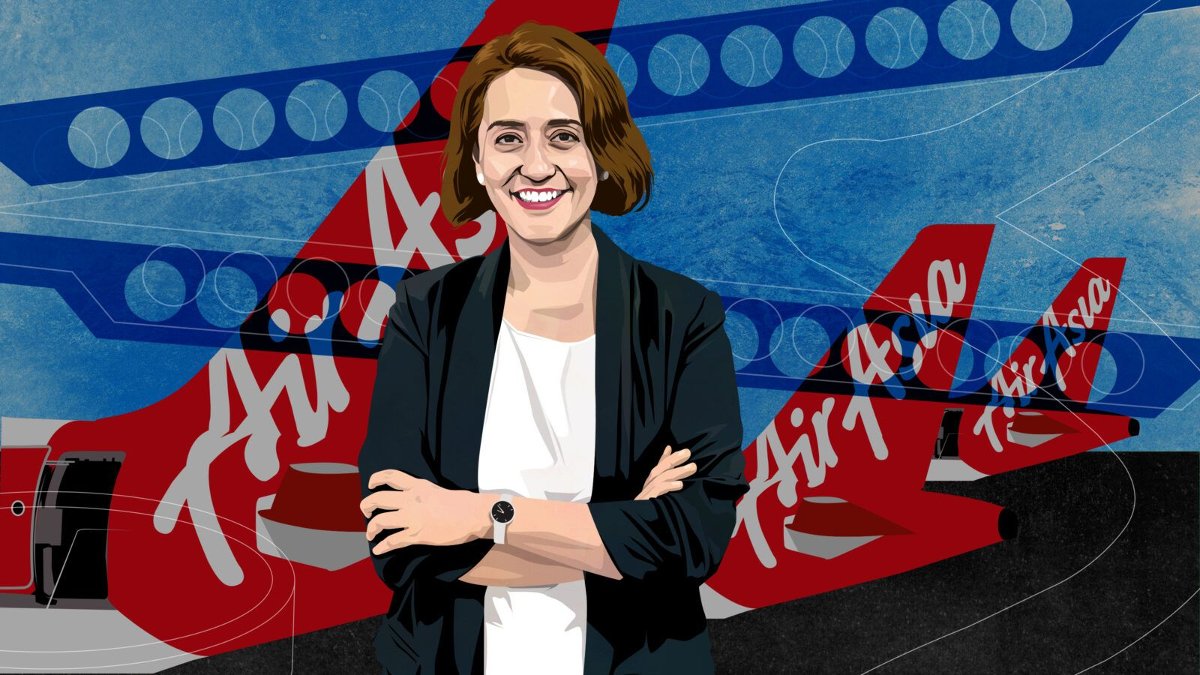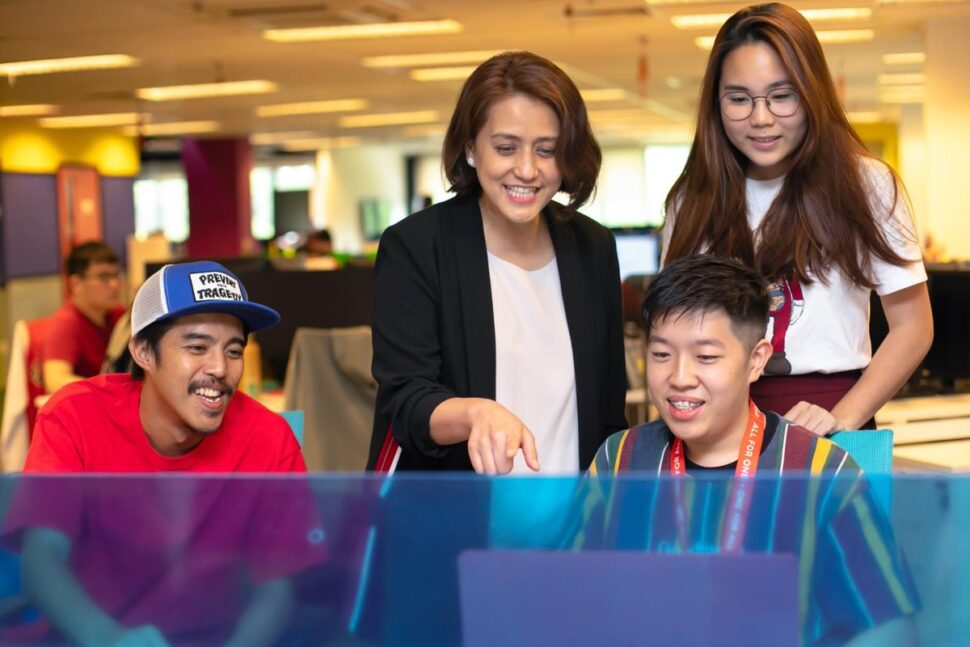29 February 2020
AirAsia HQ is an experience. Located next to Kuala Lumpur International Airport’s (KLIA) second terminal, 2,000 staff occupy nearly 200,000 square feet, meeting rooms are inspired by travel destinations, there’s a slide to the ground floor and workers can slip away to play Xbox and pass it off as work-time ideation. If it sounds like Google, know that the tech behemoth provides more than inspiration — it’s become the airline’s long-term partner.

What does Google see in the travel group? It’s been among the fastest-growing airlines globally and Skytrax ranked it as the best no-frills carrier in the world, its democratic slogan of “Now Everyone Can Fly” proving more true by the day for millions of Southeast Asians.
Bought for one ringgit (about $0.26 at the time) in 2001 by former Time Warner executive Tony Fernandes and businessman Datuk Kamarudin bin Meranun, the company is now valued at more than $1 billion. But on Feb. 3, both Fernandes and Meranun stepped aside from leadership roles at the airline’s parent company amid a massive bribery scandal with plane maker Airbus. The European multinational admitted to Britain’s Serious Fraud Office (SFO) that it bribed unnamed senior executives, paying $50 million in sponsorship to a Formula One team owned by the two AirAsia executives in exchange for an order of 135 planes. AirAsia has denied the allegations, and Malaysian authorities are investigating. It follows previous scandals over financial irregularities and dodgy discounts.
The swirling controversy puts a new spotlight on Aireen Omar, AirAsia’s CEO who has been at the helm of a digital strategy and diversification agenda that could stimulate new growth — and help the company power through scandal, if it can avoid privacy concerns. Don’t be evil, indeed.
THROUGH MACHINE LEARNING AND ARTIFICIAL INTELLIGENCE OPTIMIZATION ON ITS WEBSITE, AIRASIA ESTIMATES IT CAN SQUEEZE OUT TENS OF MILLIONS OF DOLLARS IN COST SAVINGS AND NEW REVENUE PER YEAR.
Omar, who is not implicated in the scandal, has overseen the company’s variegation into logistics, e-commerce and fintech. She is also CEO of RedBeat Ventures, the group’s new corporate venture arm that will invest in Southeast Asian tech and travel startups. It’s transformed the airline into a global, cloud-driven product and platform company seeking lifestyle brand status akin to Virgin. But AirAsia’s use of big data and biometrics is drawing scrutiny. It was one of the first airlines in the world to launch a pilot program for facial recognition for boarding.

It’s part of an expanding use of biometrics at places such as Singapore’s Changi Airport, where they are piloting clearing travelers with just an iris scan, and throughout Malaysian life. Research site Comparitech recently found the country had the world’s second most extensive and invasive use of biometrics, behind China. Malaysia’s regulatory framework is meant to follow Europe’s General Data Protection Regulation, but privacy concerns abound.
“We’re very mindful of all the data protection and policy in this region,” says Omar, 46, who shares her journey in a tightly controlled interview surrounded by colleagues.
Growing up in Petaling Jaya, near Kuala Lumpur, she was raised in a close-knit family, one girl of four siblings. She attended an English boarding school, then studied economics at the London School of Economics and New York University. This set her up to intern on Wall Street before landing a job at Deutsche Bank Securities on the trading floor.
“I wanted to see what New York had to offer,” she says, but she headed back to Kuala Lumpur in 2001 and started to tire of investment banking, wanting instead to “do something more entrepreneurial.”
The measured Omar talks about her personal life as a matter of fact, but her speech notably gains fervor when speaking about the strategy she’s led for AirAsia. In her spare time, she likes to travel. Latin America occupies her bucket list, a region untapped by her employer.
She joined AirAsia as director of corporate finance in 2006 and she was tasked with getting a large pipeline of aircraft orders financed. By 2012 she was double-hatting as CEO of AirAsia Berhad, the Malaysian subsidiary of a now global entity, while still in her corporate finance role.
In 2018, the pin dropped on how much untapped data AirAsia generated. The booking system, aircraft, engines, website, mobile web, passenger behavior and tarmac movements — it can all be captured “to provide a seamless journey for our guests from the moment they book until they reach” their destination, says Omar.
Enter Fast Airport Clearance Experience System (aka FACES). Developed by an undisclosed external AI company, it is in a pilot phase at two domestic airports — Johor Bahru and Kuching. The approach could revolutionize operations, considering the airline carried 50 million passengers last year. AirAsia has set talks in motion to deploy FACES at the more than 150 airports it flies from. (Air France, British Airways, Finnair, Lufthansa, Delta Air Lines, American Airlines and Cathay Pacific have announced similar initiatives.) It’s not been straightforward, says Omar, though she deflects to airport authorities on what sticking points remain.
Syabil Yahya, in charge of investor relations at Malaysia Airports, says they fully embrace AirAsia and Omar’s digitization strategy. KLIA has also just launched a system that relies on facial recognition.
Yahya notes, however, that AirAsia “is creating an ecosystem to keep its customers in.” KLIA2, a terminal for low-cost carriers, is 98 percent dominated by AirAsia travel and built to the company’s specification — often rankling its airport partner. “If they master every single thing, then they can run the airport themselves,” says Yahya.
Regulation is a barrier to AirAsia’s complete digital goal, according to Lye Kong Wei, AirAsia Group’s chief of data science. “A lot of things need to be decided by human beings — security checks and signatures for compliance,” he says. “That causes difficulties digitizing.”
Through machine learning and AI optimization on its website, AirAsia estimates it can squeeze out tens of millions of dollars of cost savings and new revenue per year from improving efficiencies and leveraging its trove of consumer data. Working with Google will only enhance that. Together, they’ll also be launching an online academy, which will help reskill manpower for the future.
Wei calls the collaboration “visionary,” and credits Omar’s leadership and “tireless consideration” over every decision. Now she’ll test whether an innovative airline can soar even higher as a data juggernaut.
Source: ozy.com
Site Search
Did you find what you are looking for? Try out the enhanced Google Search: